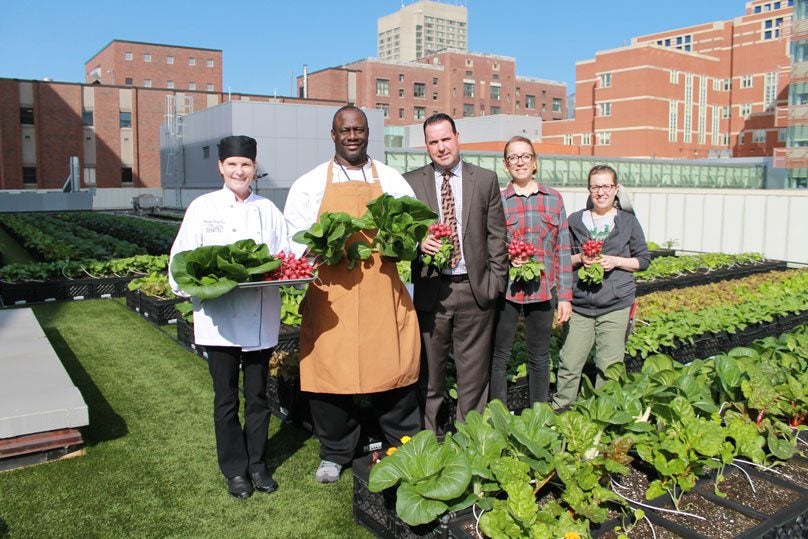Boston Medical Center deeply understands that our environment impacts our health. With two rooftop farms, BMC is working to strengthen at-risk local food systems, reduce our carbon footprint, and increase green space. The farms also support our innovative clinical program, the Preventative Food Pantry, where physicians “prescribe” supplemental foods that facilitate health and recovery for many clinical diagnoses, including cancer, heart disease, and HIV/AIDS.
Between our longstanding Power Plant Farm and our newer Newmarket Farm, BMC hosts nearly 8,000 square feet of growing space, producing fresh, nutritious, and culturally informed foods for our patients and community members.

Power Plant Farm
Three stories above BMC's power plant thrives a 2,658 square foot farm with more than 30 varieties of crops. The Power Plant Farm not only provides fresh, local produce to our hospitalized patients, cafeterias, Demonstration Kitchen, and Preventive Food Pantry, but it is also part of BMC's commitment to sustainability. The farm reduces storm water runoff, increases green space, and reduces energy use, including the energy required to transport food.
The farm, which was a year and a half in the making, began as the brainchild of Dave Maffeo, senior director of support services and Robert Biggio, senior vice president of facilities and support services, with the support of BMC's Office of Development. Dave worked with Lindsay Allen and John Stoddard of Higher Ground Farm to find a rooftop and growing system that met BMC's needs. The farm was designed and installed by Somerville-based, Recover Green Roofs, and opened in 2017.
The power plant fauna is not alone, though. Listen closely and hear the distinct buzz from the farm's resident bees. Brightly colored urban beehives, painted by BMC's pediatric patients, will help the produce pollinate while also providing local honey.

Newmarket Farm
Built on the roof of our building at 960 Mass Ave in the heart of the Newmarket District of Boston, BMC's newest rooftop farm officially opened in June 2024. While continuing the work of the Power Plant Farm and supplying crops within the hospital, Newmarket Farm also donates produce to the community surrounding BMC twice a week. Partnering with the Boston Area Gleaners, the harvests will be promptly delivered to several South End nonprofits and community centers to help strengthen local at-risk food systems and support the health and wellbeing of our community members.
Newmarket Farm grows vegetables, herbs, and beans, alongside culturally important crops, including bok choy, aji dolce peppers, and Malabar spinach. Because of the location on the roof overlooking the Boston skyline, it also optimizes sun-loving fruit, including tomatoes, and flowers that attract pollinators.
The space allows more flexible growing techniques, such as improved trellising systems for vining crops, and it is equipped on site with a fully outfitted produce washing station, which allows the team to clean, refrigerate, and distribute crops directly after harvest. Not only does this reduce food waste and gas mileage, it also ensures that crops’ nutrients are preserved for community members to enjoy.

Awards
Articles
- Modern Farmer: How One Boston Hospital Is Feeding Patients through Its Rooftop Farm
- Reuters: A Boston Hospital with a Farm on Its Roof Seeks to Inspire Others
- Edible Boston: The Hospital Rooftop Farm
- American Journal of Public Health: Implementation of a Rooftop Farm Integrated With a Teaching Kitchen and Preventive Food Pantry in a Hospital Setting
- Greenroofs.com: Announcing Greenroofs.com’s 2019 Top 10 List of Hot Trends in Greenroof & Greenwall Design
- CBS News: BMC's Rooftop Farm Recognized by the White House
